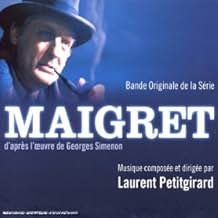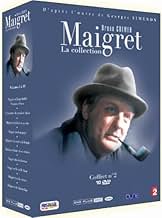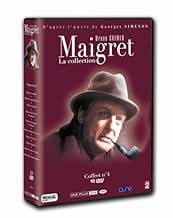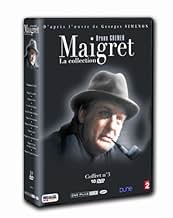Der pragmatische, zurückhaltende und raffinierte Maigret untersucht Morde auf seine einzigartig ruhige Art und Weise und findet unweigerlich die Wahrheit heraus.Der pragmatische, zurückhaltende und raffinierte Maigret untersucht Morde auf seine einzigartig ruhige Art und Weise und findet unweigerlich die Wahrheit heraus.Der pragmatische, zurückhaltende und raffinierte Maigret untersucht Morde auf seine einzigartig ruhige Art und Weise und findet unweigerlich die Wahrheit heraus.
- Auszeichnungen
- 1 wins total
Folgen durchsuchen
Empfohlene Bewertungen
An excellent detective series for any nation, and yet I've seen a lot of them, ancient or modern.
Quickly, what differentiates this Maigret 1991 from other detective series is the atmosphere, the weightlessness and above all the reality that sticks to the skin of this universe.
Maigret is a gruff bear, certainly, but he has the gift of empathy: he loves people (even delinquents) and that can be seen on the screen.
Everyone has a chance with him: he takes his time to live with them, to live in the dirt, to live in the filth of this world in which he appears like a breath of air.
I like Bruno Cremer in this series because he is both human and the God of this world.
I'm more than tired of the series that we see too often in videos on demand, in which the houses don't have an ounce of dust, in which everything is smooth, all the actors are beautiful and all the investigations are solved with DNA.
No, that's not the truth.
The truth, the reality, is rather in the darkness and filth depicted by this series.
For me, it is masterful.
Quickly, what differentiates this Maigret 1991 from other detective series is the atmosphere, the weightlessness and above all the reality that sticks to the skin of this universe.
Maigret is a gruff bear, certainly, but he has the gift of empathy: he loves people (even delinquents) and that can be seen on the screen.
Everyone has a chance with him: he takes his time to live with them, to live in the dirt, to live in the filth of this world in which he appears like a breath of air.
I like Bruno Cremer in this series because he is both human and the God of this world.
I'm more than tired of the series that we see too often in videos on demand, in which the houses don't have an ounce of dust, in which everything is smooth, all the actors are beautiful and all the investigations are solved with DNA.
No, that's not the truth.
The truth, the reality, is rather in the darkness and filth depicted by this series.
For me, it is masterful.
There have been some outstanding portrayals of Maigret, the most recent Rowan Atkinson versions being quite good, but Bruno Cremer best invokes the spirit of books. Maigret is NOT a procedural, although they are certainly mysteries. They are about people and the human condition, best demonstrated by Maigret's compassion. Sometimes for victims, and yes, sometimes even for the criminals. If there is any failing at all in this fine series, it is the relative absence of his wife, who features more strongly in the books and some other versions. One of the most re-watchable series, I had depended on MHZ to view it and finally obtained a DVD set of the entire series. If you love mysteries, you simply can NOT skip over Maigret.
I know that I may be opening myself up to some fierce criticism but I absolutely am mezmerized by Bruno Cremer's portrayal of French detective, Maigret.
His subtlety makes me wonder what he is up to and then Bam!!! He'll open up into a fit of rage at a fellow detective or criminal. I love watching him smile and wish that he would give a more emotional reaction when he is pleased.
I missed the interaction with his wife about half way through the series. They were very 'human' snipets' of a very well protected set of emotions. Anyhow, as a couple they were cute!
I am on my third run through the series, consecutively. No gaps, just straight from the last episode to episode one!
I saw sad to find out that he had passed in 2010. For me a great actor portraying one of the greats in mystery/suspense.
His subtlety makes me wonder what he is up to and then Bam!!! He'll open up into a fit of rage at a fellow detective or criminal. I love watching him smile and wish that he would give a more emotional reaction when he is pleased.
I missed the interaction with his wife about half way through the series. They were very 'human' snipets' of a very well protected set of emotions. Anyhow, as a couple they were cute!
I am on my third run through the series, consecutively. No gaps, just straight from the last episode to episode one!
I saw sad to find out that he had passed in 2010. For me a great actor portraying one of the greats in mystery/suspense.
There are two great Maigret adaptations available online or in DVDs from the 1990s, the British version done by Granada for two seasons in 1992, starring Michael Gambon, and the Dune French version that lasted from 1991 until 2005 with Bruno Cremer. Both have strong qualities, although in many ways they are completely opposite. Gambon's Maigret is affable, poetic, emotional, sympathetic, and works in close concert with his men; his Paris (Budapest) is sunny and bright. Cremer's Maigret is taciturn and intense, preferring to wait silently while people reveal themselves, riding his men hard at times, especially the often incompetent officers he encounters outside of Paris; and his Paris (Prague) is always gray or pitch black, dark wet streets, his pipe glowing. In many ways the visual look of the shows are opposite, with the British series relying more on the romance and nostalgia of Paris, while the French series is a showcase for the dark psychological mysteries of Simenon. The French series hews more closely to the original stories, and also has the advantage of the episodes being 30 minutes longer; it is also a more complete canon, with nearly 5 times as many stories. In the Gambon series, Gambon is more pleasant, his men work with him as a clever team, and we see much more of Mme. Maigret, who appears in nearly every episode, but the humor and the characterizations are typically British, which can be somewhat disconcerting. The Cremer Maigret varies in quality with the directors, but he is almost always brilliant, playing his hunches and guiding his investigations with a deep psychology that truly honors the original Simenon novels. And it goes almost without saying, the French version pulls no punches and has a much darker way of exploring aspects of the French character that the heart of Simenon; Cremer spends a lot of time listening to people and asks questions which seem strange but reveal hidden truths. Gambon's Maigret does more of the talking and seems to succeed more through luck and teamwork, which may be failings of the shorter format and the transition from French to English storytelling. I'm fond of them both, but the Cremer Maigret is one of my favorite television programs, with plenty to love, at over 75 hours. It is also possible to watch the Cremer Maigret's over and over, picking out new clues and details, but there is no such depth to Gambon's Maigret.
Love this series. Watching these episodes on Talking pictures tv. We never got the chance to see the French version of Maigret when it was originally made in the 1990s. Bruno Cremer captured the character of the inspector perfectly. Bruno's Maigret can be witty, amusing and grumpy if people irritate him. He is very fond of his food and drink. Sadly we have got to the last episode in the series.i will really miss it.
British tv sadly at present is just about box ticking controlled by the looney left. Watching this series captures just how good a tv series can be.
I'm not familiar with other French tv programs or if they are all up this high standard.
British tv sadly at present is just about box ticking controlled by the looney left. Watching this series captures just how good a tv series can be.
I'm not familiar with other French tv programs or if they are all up this high standard.
Top-Auswahl
Melde dich zum Bewerten an und greife auf die Watchlist für personalisierte Empfehlungen zu.
- How many seasons does Maigret have?Powered by Alexa
Details
Zu dieser Seite beitragen
Bearbeitung vorschlagen oder fehlenden Inhalt hinzufügen


















